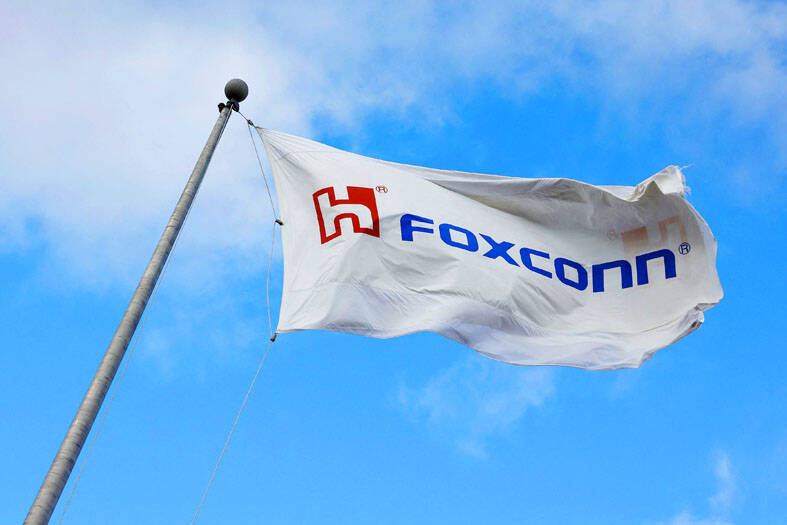Hon Hai Precision Industry Co (鴻海精密) yesterday said it has reached a deal to sell land, property, machinery and equipment at a plant in Lordstown, Ohio, to an existing business partner for US$375 million, as the company continues efforts to revitalize assets and optimize the product portfolio and operational performance of the plant.
The iPhone assembler and artificial intelligence (AI) server maker said in regulatory filings that it expects to book NT$169.36 million (US$5.7 million) in disposal gains from the deal with a company called Crescent Dune LLC, adding that it would reinvest the proceeds in its US operations and continue to be involved in the manufacturing of products for customers at the site.
Hon Hai, also known as Foxconn Technology Group (富士康科技集團), purchased the plant in 2022 from the now-bankrupt US electric vehicle start-up Lordstown Motors Corp.

Photo: Reuters
In a separate statement, the company said it has operations in six US states, with businesses covering four primary product segments: cloud and networking, smart consumer electronics, computing, components and other products.
Hon Hai highlighted significant growth in its cloud and networking business, adding that its broad business scope allows it to rapidly ramp up production and flexibly to meet customer demand.
Hon Hai said it would share more details about its US strategy in the coming months.
The latest sale came after the company last week announced it was forming a strategic partnership with industrial motor maker Teco Electric and Machinery Co (東元電機) through a share exchange to tap into the global AI data center market.
The companies expect global customers to benefit from their collaboration in terms of comprehensive data center modular products, electromechanical engineering services and cost-competitive, one-stop solutions, their joint statement said on Wednesday last week.
Analysts said the Lordstown plant is six times larger than Hon Hai’s new Houston plant, reflecting the site’s high business potential and asset value.
The deal is expected to help Hon Hai improve asset turnover efficiency and enhance its cash flow, while preserving space for manufacturing high-value-added AI applications and for expanding an AI data center business, analysts added.

South Korea’s equity benchmark yesterday crossed a new milestone just a month after surpassing the once-unthinkable 5,000 mark as surging global memory demand powers the country’s biggest chipmakers. The KOSPI advanced as much as 2.6 percent to a record 6,123, with Samsung Electronics Co and SK Hynix Inc each gaining more than 2 percent. With the benchmark now up 45 percent this year, South Korea’s stock market capitalization has also moved past France’s, following last month’s overtaking of Germany’s. Long overlooked by foreign funds, despite being undervalued, South Korean stocks have now emerged as clear winners in the global market. The so-called “artificial intelligence

NEW IDENTITY: Known for its software, India has expanded into hardware, with its semiconductor industry growing from US$38bn in 2023 to US$45bn to US$50bn India on Saturday inaugurated its first semiconductor assembly and test facility, a milestone in the government’s push to reduce dependence on foreign chipmakers and stake a claim in a sector dominated by China. Indian Prime Minister Narendra Modi opened US firm Micron Technology Inc’s semiconductor assembly, test and packaging unit in his home state of Gujarat, hailing the “dawn of a new era” for India’s technology ambitions. “When young Indians look back in the future, they will see this decade as the turning point in our tech future,” Modi told the event, which was broadcast on his YouTube channel. The plant would convert

‘SEISMIC SHIFT’: The researcher forecast there would be about 1.1 billion mobile shipments this year, down from 1.26 billion the prior year and erasing years of gains The global smartphone market is expected to contract 12.9 percent this year due to the unprecedented memorychip shortage, marking “a crisis like no other,” researcher International Data Corp (IDC) said. The new forecast, a dramatic revision down from earlier estimates, gives the latest accounting of the ongoing memory crunch that is affecting every corner of the electronics industry. The demand for advanced memory to power artificial intelligence (AI) tasks has drained global supply until well into next year and jeopardizes the business model of many smartphone makers. IDC forecast about 1.1 billion mobile shipments this year, down from 1.26 billion the prior

People stand in a Pokemon store in Tokyo on Thursday. One of the world highest-grossing franchises is celebrated its 30th anniversary yesterday.